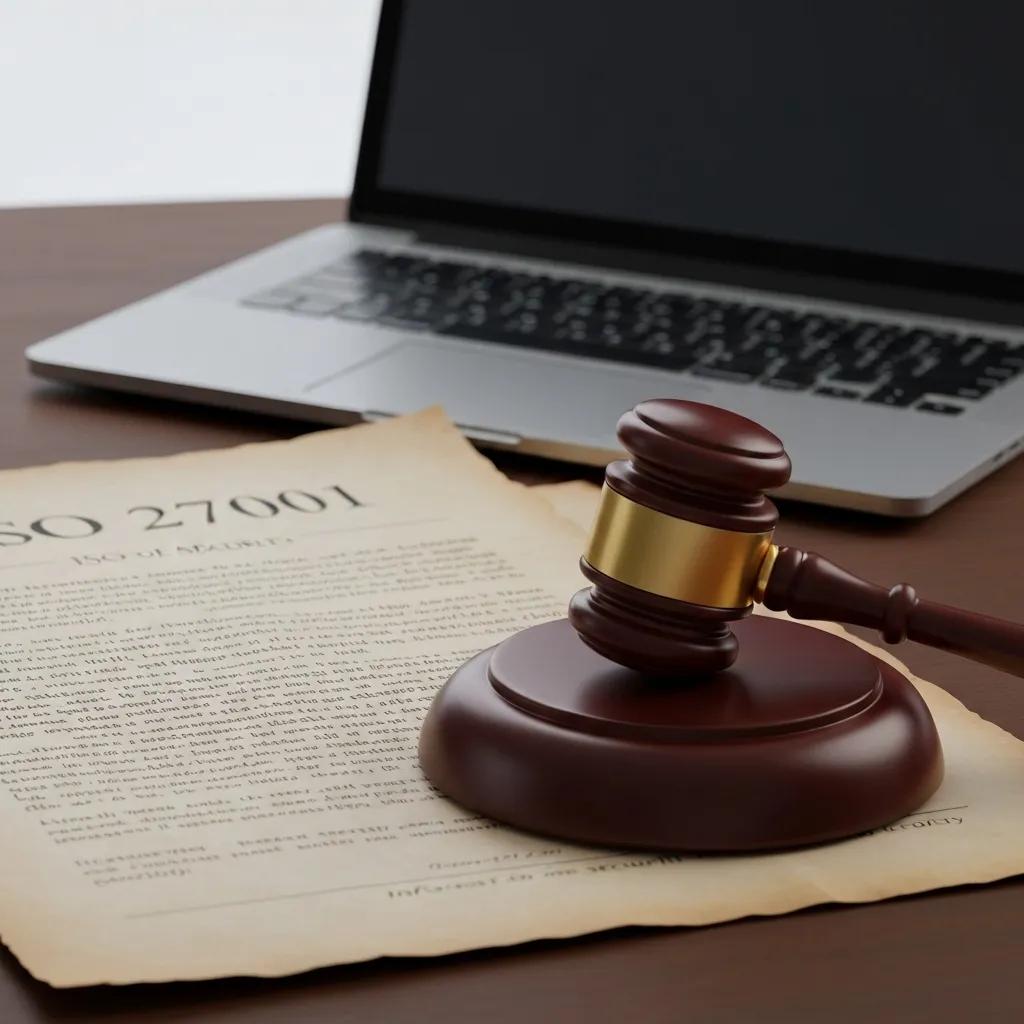Legal implications of ISO 27001: An overview

Navigating the Legal Landscape: Understanding ISO 27001 Compliance
Information security frameworks like ISO 27001 are crucial for demonstrating due diligence and avoiding the significant costs associated with data breaches. With the average global data breach costing organisations £3.8 million in 2022, grasping the legal implications of ISO 27001 compliance is vital for businesses aiming for both robust protection and a competitive edge.
IBM, Cost of a Data Breach Report (2022)
This guide will cover:
- What ISO 27001 entails and how it aligns with your legal duties
- Whether certification is a must-have and common misunderstandings
- How ISO 27001 connects with GDPR, NIS 2, UK data protection laws, and privacy extensions like ISO 27701
- The risks and penalties of non-compliance, and how certification helps mitigate them
- Practical implementation steps, including legal registers, mapping Annex A controls, and AI-powered audits
- The business advantages in terms of legal defensibility and market standing
By the end, you’ll have a clear path for using ISO 27001 as a legal assurance tool and understand how Stratlane’s AI-enhanced certification services can simplify your journey.
What is ISO 27001 and How Does it Relate to Legal Compliance?
ISO 27001 is the international benchmark for an Information Security Management System (ISMS), setting out the requirements for protecting sensitive data. Its structured controls help organisations meet legal, regulatory, and contractual obligations; for instance, by mandating encryption and access controls to prove compliance in the event of a breach. By integrating security governance into daily operations, ISO 27001 reduces the likelihood of penalties under data protection legislation, forming the bedrock for all subsequent legal alignment discussions.
What is the Role of an Information Security Management System (ISMS) in Legal Compliance?
An ISMS provides a formal structure of policies, procedures, and controls designed to manage information risks and satisfy legal obligations. It identifies legal duties—such as the breach notification timelines under GDPR—and then implements controls like incident management and asset tracking to meet those obligations. The systematic nature of an ISMS ensures tangible evidence of due diligence, which strengthens legal defence if enforcement actions arise, guiding us to explore how ISO 27001 formalises this structure.
How Does ISO 27001 Provide a Framework for Meeting Legal Obligations?

ISO 27001 organises its clauses and Annex A controls into a continuous improvement cycle, allowing organisations to interpret legal requirements—such as the technical measures stipulated in Article 32 of GDPR—and translate them into documented processes. For example, risk assessments conducted under Clause 6 demonstrate a principled approach to identifying legal gaps, while internal audits under Clause 9 provide evidence of ongoing adherence. This framework ensures that legal obligations are not only met but are also subject to continuous review, setting the stage for examining specific regulations.
Which Key Legal and Regulatory Frameworks Align with ISO 27001?
ISO 27001 aligns with numerous data protection and cybersecurity laws by mapping its controls to their specific requirements. The following table illustrates how core regulations relate to ISO 27001:
| Regulation / Directive | Legal Scope | ISO 27001 Alignment |
|---|---|---|
| GDPR | Security of data processing (Article 32) | Annex A.10 (Cryptography), Annex A.12 (Operations) |
| NIS 2 | Incident reporting and risk management | Clause 8 (Operation), Annex A.16 (Incident Mgmt) |
| Data Protection Act 2018 (UK) | National privacy enforcement | Annex A.18 (Compliance), Clause 6 (Planning) |
| HIPAA | Protection of Health Information (PHI) | Annex A.12 (Access control), Annex A.13 (Communications security) |
| CCPA | Consumer data rights and transparency | Annex A.7 (Human resources), Annex A.14 (System acquisition) |
Each regulation maps directly to ISMS components, ensuring a unified strategy for legal compliance and preparing for a deeper dive into certification requirements.
Ensuring Legal Compliance with ISO 27001 Certification
No, ISO 27001 is not a statutory law but a globally recognised best-practice standard. It does not impose legal obligations on its own; however, organisations often encounter contractual, sectoral, or regulatory mandates that effectively require ISO 27001 certification. Understanding these contexts clarifies when certification transitions from a choice to a necessity.
When Is ISO 27001 Certification Legally Mandated?
Certain sectors and contractual agreements specify ISO 27001 as a required credential:
- Public sector suppliers are often required to hold ISO 27001 certification for government contracts.
- Financial institutions frequently adopt ISO 27001 to meet banking regulators’ risk management expectations.
- Healthcare providers pursue ISO 27001 when processing Protected Health Information (PHI) necessitates recognised security standards.
These scenarios highlight how ISO 27001 evolves from a voluntary framework to a practical demonstration of legal compliance.
What Are the Legal Consequences of Non-Compliance with ISO 27001?
Failure to align security practices with ISO 27001 can lead to severe repercussions:
- Regulatory fines under GDPR, potentially reaching up to €20 million or 4 per cent of global turnover
European Commission, GDPR (2016) - Breach of contract claims and potential litigation from affected individuals
- Damage to business reputation and termination of supply chain agreements
These potential consequences underscore the importance of structured compliance and lead us to examine how certification enhances legal defensibility.
How Does ISO 27001 Certification Strengthen Legal Defensibility?
Certification provides evidence of due diligence through systematic risk assessment, documented controls, and independent audit reports.
ISO, ISO/IEC 27001:2022 – Information security management systems — Requirements (2022)
In legal proceedings, certified organisations can demonstrate adherence to recognised security practices, thereby reducing liability and potentially lowering insurance premiums. This protective effect makes certification a strategic investment in risk management and prepares us to explore specific privacy regulations.
How Does ISO 27001 Support Compliance with Data Privacy Regulations Like GDPR and NIS 2?
ISO 27001’s control set significantly overlaps with data privacy mandates by focusing on confidentiality, integrity, and availability. It establishes policies and procedures that meet GDPR’s technical and organisational requirements, while also addressing NIS 2’s cybersecurity directives. This synergy ensures that investments in ISO 27001 directly contribute to compliance across multiple regulatory frameworks.
What Are the Core GDPR Requirements Addressed by ISO 27001?
- Encryption and pseudonymisation, aligning with Article 32’s security principles
- Regular vulnerability assessments that support documentation and accountability
- Incident response procedures that facilitate timely breach notifications
These mappings illustrate how ISO 27001 mechanisms effectively satisfy GDPR’s stringent security obligations.
How Does ISO 27001 Align with the NIS 2 Directive’s Cybersecurity Mandates?
NIS 2 mandates robust risk management, incident reporting, and third-party governance. ISO 27001’s risk assessment process (Clause 6) and its incident handling controls (Annex A.16) align closely with these requirements. By maintaining documented evidence of risk treatment and reporting timelines, organisations can meet NIS 2 obligations while reinforcing a strong ISMS.
What Role Does ISO 27701 Play in Enhancing Privacy Compliance?
ISO 27701 builds upon ISO 27001 by introducing a Privacy Information Management System (PIMS) layer that directly maps to GDPR and other privacy regulations. It incorporates additional controls for managing the personal data lifecycle and upholding data subject rights, ensuring that privacy governance is integrated seamlessly into existing ISMS processes.
How Can ISO 27001 Help Meet UK-Specific Data Protection Laws?
Under the Data Protection Act 2018, UK organisations must implement appropriate security measures and demonstrate accountability. ISO 27001’s Annex A.18 (Compliance) and its emphasis on audit trails provide clear evidence of fulfilling national data protection obligations, facilitating alignment with UK-GDPR guidance.
What Are the Legal Risks and Financial Penalties of Failing ISO 27001 Compliance?
Non-compliance with ISO 27001 can expose organisations to data breaches, regulatory fines, and reputational damage. By identifying vulnerabilities and implementing standardised controls, an ISMS effectively mitigates these risks. Examining specific risk scenarios highlights how certification can reduce legal and financial exposure.
How Can ISO 27001 Mitigate Data Breach Legal Risks?
ISO 27001’s structured risk assessment process identifies potential breach pathways, while Annex A controls—such as asset inventory, access control, and encryption—minimise the likelihood and impact of a breach. This proactive approach limits legal liability by demonstrating that reasonable security measures were in place.
What Are the Potential Financial and Reputational Costs of Non-Compliance?
The global average cost of a data breach reached £3.8 million in 2022, encompassing fines, litigation, and remediation expenses. Beyond financial penalties, organisations risk losing customers, facing negative publicity, and experiencing supply chain disruptions. These cumulative costs underscore the business imperative of a certified ISMS.
How Does ISO 27001 Certification Reduce Exposure to Regulatory Fines?
Certification offers documented proof of adherence to GDPR, NIS 2, and relevant sectoral laws. Regulators often consider certification when assessing penalties, and certified companies typically benefit from reduced fines or more favourable settlement terms. This outcome-driven advantage of certification directly protects the organisation’s financial health.
How to Implement ISO 27001 for Effective Legal Compliance: Practical Steps and Tools
Implementing ISO 27001 involves defining the scope, conducting risk assessments, mapping legal obligations, and selecting appropriate controls. A well-structured ISMS transforms legal requirements into actionable tasks, ensuring that compliance is verifiable and repeatable. The following sections detail key implementation elements.
What Is an ISO 27001 Legal Register and How Do You Build One?
A legal register is a documented inventory of all applicable laws, regulations, and contractual obligations. To create one:
- Identify relevant legislation (e.g., GDPR, Data Protection Act 2018).
- Catalogue specific requirements (e.g., notification periods, record-keeping duties).
- Map these obligations to ISO 27001 controls and assign responsibility.
A meticulously maintained legal register ensures that every requirement is tracked, reviewed, and audited regularly, supporting ongoing compliance.
Which Annex A Controls Are Critical for Legal and Regulatory Compliance?
To effectively align legal obligations with security controls, focus on:
| Control Description | Legal Objective | Impact |
|---|---|---|
| Annex A.10 – Cryptography | Safeguard data in transit and at rest | Ensures confidentiality as per GDPR Article 32 |
| Annex A.16 – Incident Mgmt | Meet breach notification deadlines | Demonstrates due diligence for NIS 2 reporting |
| Annex A.18 – Compliance | Maintain evidence of legal reviews | Facilitates audits under the UK Data Protection Act 2018 |
These critical controls form the foundation of legal adherence within an ISMS.
How Can Sector-Specific Legal Requirements Be Addressed with ISO 27001?
Different industries face unique obligations:
- Finance: Integration with PCI DSS through Annex A.14 (system acquisition) and Annex A.15 (supplier relationships).
- Healthcare: Alignment with HIPAA via Annex A.12 (access control) and Annex A.13 (communications security).
- Legal services: Management of client confidentiality requirements under Annex A.6 (organisation of information security).
Tailoring Annex A controls to specific sectoral regulations ensures comprehensive legal coverage.
How Does AI Enhance ISO 27001 Audits for Legal Compliance?
AI-powered audit tools can analyse policy documents, control evidence, and risk assessments at scale, identifying compliance gaps more efficiently than manual methods. By automating evidence gathering and anomaly detection, AI improves accuracy and can reduce audit effort by up to 40 per cent. Stratlane’s ISO 27001 certification services leverage this advanced approach to deliver streamlined and reliable legal compliance assessments.
What Are the Benefits of ISO 27001 Certification for Legal Assurance and Business Reputation?

ISO 27001 certification signals to regulators, customers, and partners that an organisation adheres to recognised best practices. By embedding legal compliance into its core operations, certification builds trust and establishes a sustainable security posture that supports long-term business growth.
How Does Certification Demonstrate Commitment to Data Protection Laws?
Certification offers independent validation of an organisation’s policies, risk assessments, and control implementations. This visible commitment assures regulators and data subjects that security obligations—such as breach notifications and data minimisation—are taken with the utmost seriousness.
What Competitive Advantages Does ISO 27001 Provide in Legal Compliance?
A certified ISMS can set you apart in procurement processes, unlock new market opportunities, and improve eligibility for public sector tenders. Demonstrating legal alignment through ISO 27001 often becomes a deciding factor in securing contracts and forging partnerships.
How Does ISO 27001 Facilitate Ongoing Regulatory Compliance and Risk Management?
The PDCA (Plan-Do-Check-Act) cycle, central to ISO 27001, drives continuous improvement. Regular reviews, internal audits, and management evaluations ensure that controls remain aligned with evolving legal requirements, making ongoing compliance a systematic rather than a reactive process.
Frequently Asked Questions About the Legal Implications of ISO 27001 Compliance
This section provides concise answers to common legal questions, offering quick insights without requiring extensive reading of earlier sections.
Is ISO 27001 Mandatory for All Organisations?
ISO 27001 remains a voluntary standard, but many legal frameworks, industry regulations, and contractual agreements effectively mandate its certification to ensure robust security and compliance.
How Does ISO 27001 Help Avoid GDPR Fines?
By implementing Annex A controls that address Article 32 requirements—such as encryption and vulnerability assessments—ISO 27001 significantly reduces the risk of personal data breaches and provides regulators with documented evidence of security measures.
What Is the Difference Between ISO 27001 and NIS 2 in Legal Terms?
ISO 27001 is a voluntary best-practice framework, whereas NIS 2 is a binding EU directive that mandates specific cybersecurity measures and incident reporting obligations. However, ISO 27001 certification aligns closely with NIS 2 requirements.
Can Small Businesses Benefit Legally from ISO 27001 Certification?
Absolutely. Even small businesses gain legal defensibility by demonstrating due diligence, reducing breach risks, and meeting customer or partner compliance requirements without the complexity of bespoke security programmes.
How Often Should ISO 27001 Legal Compliance Be Reviewed?
Legal compliance within an ISMS should be reviewed at least annually. Additional reviews should be triggered by significant regulatory changes—such as new GDPR guidance or NIS 2 implementation deadlines—to ensure continuous alignment.
ISO 27001 extends beyond technical security to become a strategic asset for legal assurance and competitive advantage. By systematically mapping regulations to ISMS controls and leveraging AI-driven audit efficiencies, organisations can achieve a sustainable compliance posture. Contact Stratlane to explore how our ISO 27001 certification services can simplify your legal alignment journey and protect your business reputation.